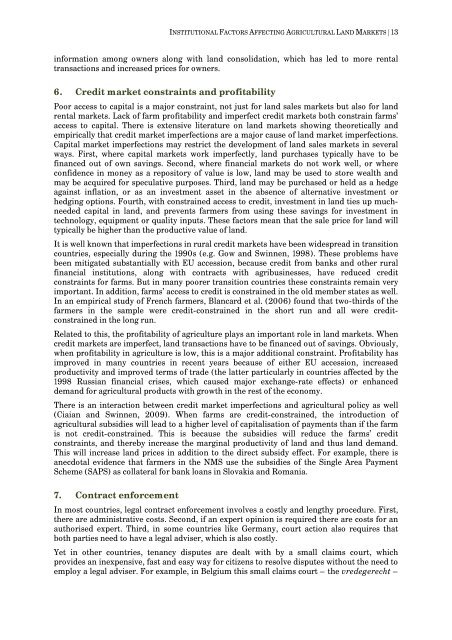Institutional Factors Affecting Agricultural Land Markets
Institutional Factors Affecting Agricultural Land Markets
Institutional Factors Affecting Agricultural Land Markets
You also want an ePaper? Increase the reach of your titles
YUMPU automatically turns print PDFs into web optimized ePapers that Google loves.
INSTITUTIONAL FACTORS AFFECTING AGRICULTURAL LAND MARKETS | 13<br />
information among owners along with land consolidation, which has led to more rental<br />
transactions and increased prices for owners.<br />
6. Credit market constraints and profitability<br />
Poor access to capital is a major constraint, not just for land sales markets but also for land<br />
rental markets. Lack of farm profitability and imperfect credit markets both constrain farms’<br />
access to capital. There is extensive literature on land markets showing theoretically and<br />
empirically that credit market imperfections are a major cause of land market imperfections.<br />
Capital market imperfections may restrict the development of land sales markets in several<br />
ways. First, where capital markets work imperfectly, land purchases typically have to be<br />
financed out of own savings. Second, where financial markets do not work well, or where<br />
confidence in money as a repository of value is low, land may be used to store wealth and<br />
may be acquired for speculative purposes. Third, land may be purchased or held as a hedge<br />
against inflation, or as an investment asset in the absence of alternative investment or<br />
hedging options. Fourth, with constrained access to credit, investment in land ties up muchneeded<br />
capital in land, and prevents farmers from using these savings for investment in<br />
technology, equipment or quality inputs. These factors mean that the sale price for land will<br />
typically be higher than the productive value of land.<br />
It is well known that imperfections in rural credit markets have been widespread in transition<br />
countries, especially during the 1990s (e.g. Gow and Swinnen, 1998). These problems have<br />
been mitigated substantially with EU accession, because credit from banks and other rural<br />
financial institutions, along with contracts with agribusinesses, have reduced credit<br />
constraints for farms. But in many poorer transition countries these constraints remain very<br />
important. In addition, farms’ access to credit is constrained in the old member states as well.<br />
In an empirical study of French farmers, Blancard et al. (2006) found that two-thirds of the<br />
farmers in the sample were credit-constrained in the short run and all were creditconstrained<br />
in the long run.<br />
Related to this, the profitability of agriculture plays an important role in land markets. When<br />
credit markets are imperfect, land transactions have to be financed out of savings. Obviously,<br />
when profitability in agriculture is low, this is a major additional constraint. Profitability has<br />
improved in many countries in recent years because of either EU accession, increased<br />
productivity and improved terms of trade (the latter particularly in countries affected by the<br />
1998 Russian financial crises, which caused major exchange-rate effects) or enhanced<br />
demand for agricultural products with growth in the rest of the economy.<br />
There is an interaction between credit market imperfections and agricultural policy as well<br />
(Ciaian and Swinnen, 2009). When farms are credit-constrained, the introduction of<br />
agricultural subsidies will lead to a higher level of capitalisation of payments than if the farm<br />
is not credit-constrained. This is because the subsidies will reduce the farms’ credit<br />
constraints, and thereby increase the marginal productivity of land and thus land demand.<br />
This will increase land prices in addition to the direct subsidy effect. For example, there is<br />
anecdotal evidence that farmers in the NMS use the subsidies of the Single Area Payment<br />
Scheme (SAPS) as collateral for bank loans in Slovakia and Romania.<br />
7. Contract enforcement<br />
In most countries, legal contract enforcement involves a costly and lengthy procedure. First,<br />
there are administrative costs. Second, if an expert opinion is required there are costs for an<br />
authorised expert. Third, in some countries like Germany, court action also requires that<br />
both parties need to have a legal adviser, which is also costly.<br />
Yet in other countries, tenancy disputes are dealt with by a small claims court, which<br />
provides an inexpensive, fast and easy way for citizens to resolve disputes without the need to<br />
employ a legal adviser. For example, in Belgium this small claims court – the vredegerecht –








